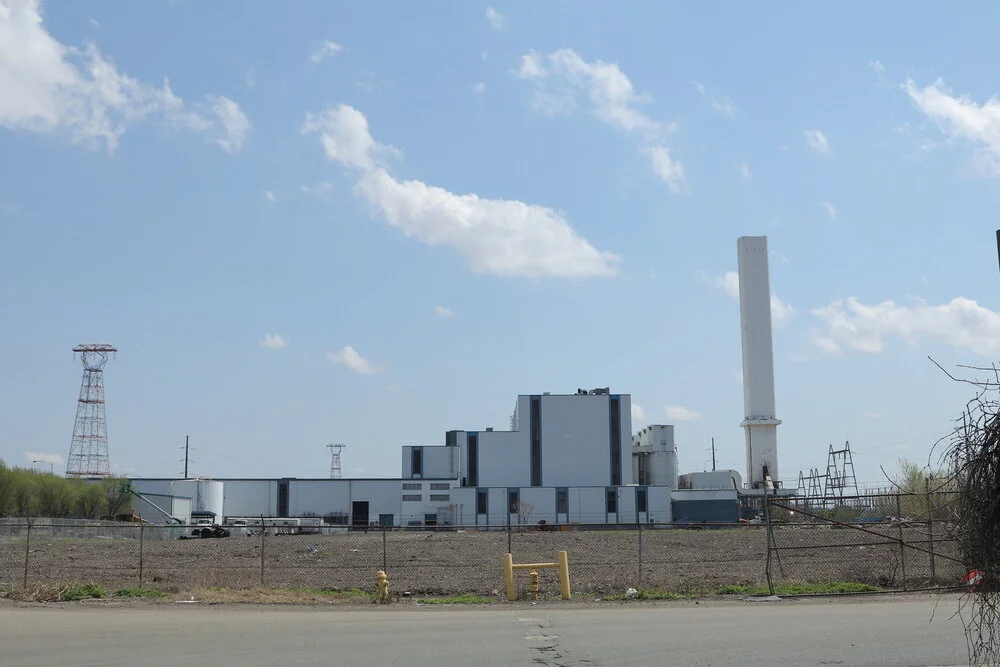Zero Waste and Environmental Justice
At the Swarthmore Borough Council legislative session on Monday, March 8, council voted to pass the Zero Waste Resolution presented by Environment Committee Chair Lauren McKinney at the previous week’s work session. The vote was 6-0.
The Covanta facility in Chester
The measure, which Delaware County Council could accept or reject, calls on Delaware County Council to commit to reducing overall waste, and to ensure that the Delaware County Solid Waste Authority end its contract with Covanta. Covanta operates the Delaware Valley Resource Recovery Facility trash incinerator in Chester where much of the county’s trash is burned. Council president Mary Walk recused herself from the vote because she works for the county.
Over 30 people attended the March 8 meeting, with 13 community members voicing their support for the resolution during public comment.
“The Covanta facility is a stunning, ugly example of environmental racism,” said Swarthmore resident Mark Wallace. “No white-majority well-resourced community in Delaware county would put up with such a facility in its backyard.”
Ruth Gordon expanded on these sentiments, declaring that “environmental justice” is what is at stake here. “As one of the few Black residents of Swarthmore, I would prefer that we move to zero waste and not dump our waste in a majority Black community that often has to choose between economic viability and environmental degradation,” Gordon said.
Disconnect Between City Government and Residents
Some council and community members expressed concern about how this resolution would affect Chester and whether it aligns with residents’ desires. McKinney reported that she spoke with Chester mayor Thaddeus Kirkland, who said he finds Covanta to be a good neighbor.
McKinney acknowledged that Covanta provides jobs for Chester residents and pays the city between three and five million dollars a year in host fees. Host fees are payments negotiated between the city and the company in compensation for the effects of dump trucks and similar hardships associated with hosting the facility.
“That’s why communities accept these plans, because they get a good chunk of income from them. It’s a trade-off that wealthier communities don’t ever have to make,” said McKinney.
While the current elected officials of Chester may be on board with having Covanta in their city, Helen Nadel advocated respecting environmental and civic organizations in Chester who also represent residents’ interests. “As someone from Swarthmore who’s outside of the Chester community, I should respect the elected officials in Chester,” she said. “However, to assume that they are the only people who represent Chester’s families and children’s interests is shortsighted.”
Council president Mary Walk made an exception to the rule that only borough residents may speak at council meetings to allow Chester resident (and Swarthmorean contributor) Stefan Roots to share his insight during public comment. Roots is running for Chester City Council in the upcoming election.
“There is a disconnect between our city government and the residents, and Covanta is the perfect example,” Roots said. “Mayor Kirkland and his administration support Covanta because of the host fees and the six to seven jobs that they provide to residents. But most residents oppose having Covanta in our town.”
A grassroots community organization, Chester Residents Concerned for Quality Living, first drafted the Zero Waste Resolution. The group has been working for environmental justice in Chester since 1992. Their website includes a petition, “Ban the Burn,” which, like the zero-waste resolution, implores the Delaware County Council to seek an end to the authority’s contract with Covanta.
The Delaware County Solid Waste Authority is the agency responsible for what happens to all the county’s trash. Members, who are appointed by the county council, serve staggered five-year terms.
The petition also asks the council to commit to replacing revenue Chester would lose through cancellation of the contract. It reads, in part, “Please do not sacrifice the health of Chester residents by allowing our city to be a regional hub for waste burning. Please support making Chester whole financially without making us choose between solvency and our health.”
What Are the Alternatives?
While Swarthmore Mayor Marty Spiegel said he supports the move to zero waste, he wondered about available alternatives to Covanta. “Where would the waste go?” he asked. “It has to go somewhere.”
McKinney suggested that landfills could be an option. But, she said, that decision ultimately will be the county’s to make. In addition to other provisions, the zero-waste resolution calls for forming a zero-waste task force and undertaking a zero-waste audit.
According to Jennifer Pfluger, a Swarthmore Environmental Advisory Council associate member who is also a member of the Chester quality-living group, “Advancing this resolution to the county level would mean that the county would have to hire experts to help figure out where to send the waste.”
View this or any other Swarthmore Borough Council meeting.
The next council meeting is Monday, April 5, at 7:30 p.m. Details are on the borough’s website.




